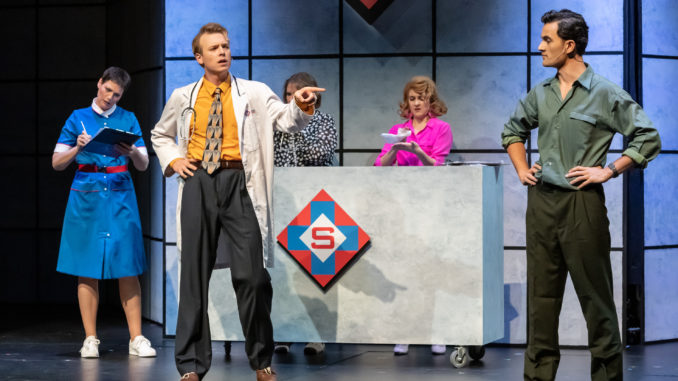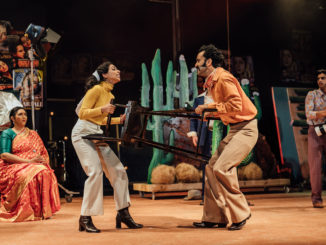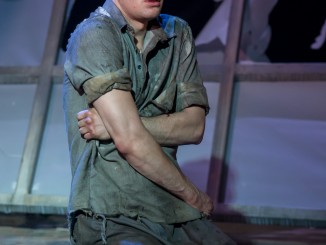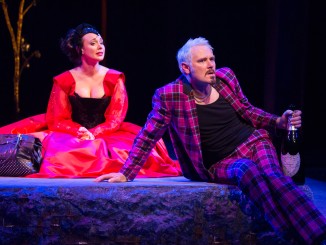
[Make No Bones About It]
The question of whether the result of Shortland Street the television series can be considered successful need only be measured by one fact: 26 years. But with new mediums come new risks. For every The Lion King and The Producers stage musical adaptation there is a Spider-Man: Turn Off the Dark and The Fly. Fortunately, Shortland Street – The Musical navigates this with a theatrical duality that is often missing from not only New Zealand productions, but also new scripts. Four plus years of development goes a long way – and it shows. In this instance, the duality is achieved by making the production feel both old and new at the same time, with familiar plots and characters, and new and conducive modes of storytelling respectively.
Combining multiple storylines from the series’ early years, the narrative manages to be not only simple in its dramatic friction, but also complex in its effect – although [Spoiler – Hightlight to Read] nurse Alison Raynor’s (Ailis Oliver-Kerby) miscarriage is dealt with incredibly flippantly, and [End Spoiler] nurses Carrie Green (Lisa Chappell) and Jaki Manu’s (Bronwyn Turei) storylines are incorporated less as parallel B plots and more as scene fodder. While the central plots in act one focus on a restructuring of the clinic by Sir Bruce Warner (played with delightful antagonism by the comically gifted Mark Hadlow) and the conflict between doctors Guy Warner and Hone Ropata, played by co-creator Guy Langford and Justin Rogers respectively, act two develops the Warner/Ropata relationship, as well as expanding on those between Kirsty Knight and Lionel Skeggins (Torum Heng and Tom Clarke), and Rachel McKenna and Nick Harrison (Comfrey Sanders and Chris Parker) established before interval.
This dramaturgical structuring of events that were originally scattered across twenty-three-minute televised sequences is a perfect example of both the time and care Langford and co-book-writer and director Simon Bennett have taken in developing the project. With over 20 years of source material, some might consider the task easy, but too much of something is never a good thing. The 90s limitation provides a stronger narrative back-bone, and allows for allusions towards the future of certain characters and events, which is best illustrated in Hadlow and the ensemble’s ‘Be A Villain’. Though the formats are entirely adverse, the often ridiculous extremity of soap-opera events works perfectly for the heightened drama of musical theatre. What is required to make this work, however, are committed performances grounded in truth.
Fortunately, Auckland Theatre Company have gathered some of the best theatrical talents New Zealand has to offer. Playing iconic characters can be a daunting task for any performer, but the cast of Shortland Street – The Musical tackle it spectacularly well. This is because their performances are based not on a mimicry of the original actors’ performances, but from an evocation of their characters. This is particularly evident in Rogers’ swagger, Clarke’s vulnerability, and Sanders’ and Parker’s teenage capriciousness.
This nostalgia is spit-shined to a fine polish thanks to the cumulative effect of a brilliant design team, with Elizabeth Whiting’s era-specific and show-authentic costumes, John Parker’s impressive yet simple set design, Bryan Caldwell’s lighting design (which is both gaudy and pointed as necessary) and Arran Eley’s balanced sound design. The icing on the (cup)cake, however, comes from Oliva Tennet. While there are naturally varied levels of dance experience among the cast, not one member looks out of place (though Rebekkah Schoonbeek-Berridge and Tavai Faasavalu are particular standouts), and Tennet’s vivacious choreography is not only slick, but also in tune with the musical numbers.
Composer Luke Di Somma notes in the programme how the moderate climate of New Zealand’s socio-political landscape is ingrained in our theatrical language – and it’s true. But he also titles the piece ‘The Golden Age of The Kiwi Musical. With recent productions such as Daffodils, Valerie, and Di Somma’s own That Bloody Woman, it’s not implausible to envision the trajectory he proffers. We are a small, young, but optimistic nation, and that optimism, which has resulted in our television and film work making waves overseas, has begun to influence our theatrical language. Whether you love or hate either Shortland Street or musicals, the combination is one of the most entertaining and enjoyable theatrical events of the year, and with a five-city tour planned for 2019, there is no doubt the show will soon be world famous in New Zealand, and perhaps further.
Shortland Street – The Musical plays the ASB Waterfront Theatre until 9 December.




Leave a Reply